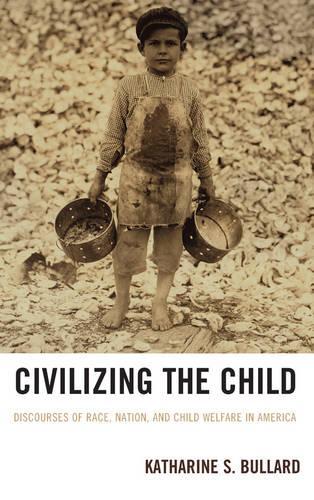
Civilizing the Child: Discourses of Race, Nation, and Child Welfare in America
(Paperback)
Publishing Details
Civilizing the Child: Discourses of Race, Nation, and Child Welfare in America
By (Author) Katharine S. Bullard
Bloomsbury Publishing PLC
Lexington Books
15th October 2015
United States
Classifications
Professional and Scholarly
Non Fiction
History of education
Child welfare and youth services
Social discrimination and social justice
362.70973
Physical Properties
Paperback
158
Width 165mm, Height 234mm, Spine 11mm
249g
Description
In Civilizing the Child: Discourses of Race, Nation, and Child Welfare in America, Katherine S. Bullard analyzes the discourse of child welfare advocates who argued for the notion of a racialized ideal child. This ideal child, limited to white, often native-born children, was at the center of arguments for material support to children and education for their parents. This book illuminates important limitations in the Progressive approach to social welfare and helps to explain the current dearth of support for poor children. Civilizing the Child tracks the growing social concern with children in the nineteenth and early-twentieth centuries. The author uses seminal figures and institutions to look at the origins of the welfare state. Chapters focus on Charles Loring Brace, Jacob Riis, residents of the Hull House Settlement, and the staff of U.S. Childrens Bureau, analyzing their work to unpack the assumptions about American identity that made certain children belong and others remain outsiders. Bullard traces the ways in which child welfare advocates used racialized language and emphasized the civilizing mission to argue for support of white native-born children. This language focused on the future citizenship of some children as an argument for their support and protection.
Reviews
Bullards most interesting contribution is her linkage of race, children, and social welfare. Concerned with the nations racial composition, reformers turned to poor white children and children of immigrants, attempting to civilize and mold them for citizenship. The final chapter, on the Childrens Bureau, is the books strongest, with compelling sources and a clearer narrative. Bullard brings together the threads of race, nation, and childhood to demonstrate that the Childrens Bureau helped to establish a nominal social citizenship for white American children. Here, too, Bullard clearly shows the role of social science in building racial distinctions into the mechanisms of the modern state. [T]he book [is] approachable. Precisely because reformers like Riis and Addams are likely to be familiar names for students, individual chapters could stand alone in undergraduate courses. Bullards evenhanded insights enrich our understanding of social reform, particularly reformers motivations. Scholars of race, childhood, and welfare will find interesting new insights into child welfare policys links with developments in social citizenship and the racialization of the modern American state. * Journal Of The History Of Childhood And Youth *
This thought-provoking study of child welfare reformers in the early twentieth-century U.S. argues that racial difference, national identity, and imperialist assumptions both inspired reformers programs to improve the lives of the nations children and set limits on their notions of deserving childhood. While reformers integrated the children of European immigrants into their vision of the ideal child upon whose welfare the fate of the nation depended, they did so by drawing increasingly rigid boundaries between whitened Americans, who could lay claim to the nations settler heritage, and racialized OthersAfrican Americans, Asian Americans, Mexican Americans, and Native Americanswho did not fit into the national mythology of newcomers seeking (and finding) success in the New World. Civilizing the Child is a solidly researched and provocatively argued study that will be of interest to historians of social welfare and public policy, children and childhood, race and empire, and nineteenth- and twentieth-century America. -- Anya Jabour, University of Montana
Author Bio
Katherine Bullard is assistant professor in the School of History, Political and International Studies at Fairleigh Dickinson University.
